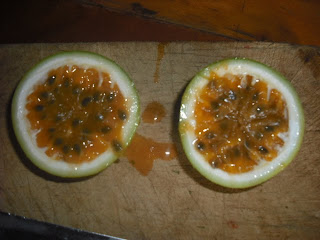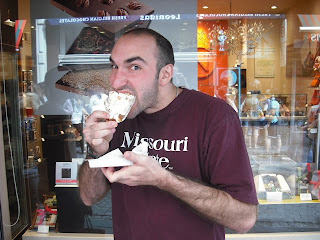 |
| Myself, the two Americans and two African novices |
 |
| Chris, Jeremy, and I on the roof of the Kenyatta International Conference Center in Nairobi |
Upon our afternoon arrival we were hungry and decided to enter the first restaurant in site. A journey up two flights of stairs brought us to a dimly lit establishment offering lunch on red suede couches and chairs. As we observed the ambiance, strategically placed poles and unoccupied stage surrounded by a red suede curtain, it became apparent that we had entered a business that serves low quality food during the day and offers alternative entertainment by night. We elected to move onto the next restaurant we saw. The food was suspect but the beers we ordered, which were the first cold drinks I tasted in over three weeks, were delicious.
After exploring the city center for several hours, we walked to our hostel to clean up before dinner. The total expense per person for two nights in the hostel was $20. The absence of warm water, which would normally cause me frustration, was an insignificant setback that could not diminish my excitement of living with indoor plumbing for a weekend (pressurized showers presented a pleasant break from the bucket showers I take in my eco-bathroom in the village). We chose a blues restaurant for dinner in hope of eating some familiar food. Ironically we enjoyed the Kenyan's version of pasta and hamburgers while listening to Tupac in the background (the Kenyan Miles Davis must have had the night off).
 |
| Yanging with the Germans we met in our hostel |
Saturday consisted of leisurely strolling around the city in hopes of finding basic items such as phone chargers and t-shirts. You can find most everything in Nairobi, although finding hardware supplies proved to be a challenge. Hoping to experience more tastes of home, Jeremy and I shared a pizza. There is no doubt that it was the least satisfying pizza I have ever eaten (which I expected).
All three of us ate modestly on Saturday afternoon in preparation for our dinner at "Carnivore". "Carnivore" is a restaurant located in the wealthy Nairobi suburb of Karen about 20 minutes from the city center. It is famous for serving exotic and rare meat and has been rated one of the top 50 best restaurants in the world multiple times. This is the sequence of the meal: 1. A large tray of salads, breads, and meat sauces are brought to the table; 2. You nibble on the salads and bread (filler food before the main course); 3. To indicate you are ready for the endless variety and quantity of meat, you must place the small white flag vertically on your tray in the upright position; 4. Immediately, gluttonous amounts and varieties of meat are presented on large skewers and swords (yes, real swords!) and cut by the butcher directly onto your personal plate; 5. You dip each type of meat in its own unique dipping sauce that is designed to best compliment the flavor of the meat as the butchers continually present more meat in a rotation pattern until you indicate your surrender by putting your flag down; 6. The main course of meat is followed by a light dessert accompanied by tea or coffee.
 |
| Carnivore barbeque pit |
 |
| A butcher shaving meat from a sword onto our plates |
 |
| Chicken on skewers |
The meat offered that evening included: ostrich meatballs, ostrich, pork sausage, lamb ribs, chicken legs, chicken wings, chicken thighs, camel, ox heart, ox liver, beef, lamb sausage, turkey, and ham. Chris asked one of the butchers if crocodile was being served. The butcher explained that it was not on the menu that evening but had the cooks prepare one piece for each of us. Although crocodile, ostrich, and camel were three of my favorites, the lamb sausage prevailed as best flavor. Everything was ridiculously tasty though. My least favorite was actually the beef. It was dryer and tougher relative to some of the more juicy and tender exotic meats. Jeremy and Chris’ strategy was to take a piece of meat every time it was offered no matter what kind. I, on the other hand, tried every type of meat once and then focused my attention on the exotic and expensive meats that I rarely taste (camel, lamb sausage, and ostrich).
 |
| The flag, salads and meat sauces. The upright flag indicated to the butchers that we were ready for the meat. |
 |
| Chris reluctantly lowering our flag in surrender. We could eat no more! |
While waiting for our table, I met a Norwegian couple in their mid-30s that had decided to grab some dinning during their 5 hour flight lay-over back to Norway. They proceeded to tell me that they had just visited the polytechnic school that they had raised $2 million to build in Sudan. After inquiring about their safety during their time in Sudan, they tried to assure me that a foreigner is safe if escorted by a Sudanese local. They failed as they admitted that they were stopped multiple times and questioned at police check points along the road during their 3 day visit. It was a pleasure to meet such generous people.
 |
| The Norwegian couple we met at Carnivore |
My Internal Moral Conflict.......I experienced a unique and quite frankly awesome evening at "Carnivore". I wish I could say that the dinner experience was perfect, but it was not. As I sat in a truly utopian looking courtyard, I was overcome by a sobering slap of internal turmoil as the reality of my experience at this wonderful restaurant was brought into perspective. Where were all the Kenyans? Of the 200+ customers at the restaurant, maybe 20 were native, black Kenyans. The rest were individuals native to America, Britain, Australia, various Arab Nations, and India. This was not the "real" Kenya. The Kenya I have been living in for the last month. This was the most extreme of contrasts from the slums, one of which is located less than 10 miles away. As I was devouring the all-you-can-eat buffet that included some of the rarest and most exotic meats in the world, countless thousands of fellow human beings were surviving a food-less evening in their 10ft by 10ft shacks which often shelter 8 or more surrounded by a flood of feces and trash. The extreme contrast in quality of life that was separated by a 10 minutes care ride was disheartening. Furthermore, it was difficult to completely embrace the reality that much of the wealth was possessed by many foreigners that have thrived off the land at the expense of the natives. I doubt it would have made me feel better to see a majority of native Kenyans dining that night aware of the poverty just minutes away, but maybe it would have helped. This is what I mean when I say my Internal Moral Conflict. The internal conflict was temporarily silenced when I thought of my great uncle Angelo's advice. He would always emphasize the importance for visitors and volunteers to experience both the good and bad of Kenya. Westerners continually hear about all the poverty and problems in Africa, but he wanted visitors to also see the beauty of the country. If you came to Kenya and only saw the slums and poverty, he would say that you failed to see the entire country and all that it offers. His words and advice helped me settle down and enjoy the evening.
Overall, I enjoyed Nairobi. I will admit that I was conned a few times at the market place but have now learned valuable bargaining lessons. The market merchants do not know the meaning of "NO". I now have no problem being rude and mean to these merchants that are willing to say anything to con a white person. I can not afford to waste my money on overpriced items that are falsely labeled "authentic" when so many orphans in the village lack basic necessities such as shoes.
This Saturday we had a joint party in the guest house to celebrate my birthday and to wish a farewell to a volunteer leaving this week. I purchased 12 avocados, 10 tomatoes, and cilantro in the village for under $3 (to make a tasty salad). The cost for all 12 avocados totaled $2.50 (not a bad price compared to the states). The salad is one of my favorite dishes prepared in the village, and I insisted on including it in the meal. Elaine, the departing volunteer, bought 3 chickens from the village livestock which was used to make a stew. 25 staff members came for the dinner celebration. I would like to think that everyone came to the celebration because of how fond they are of Elaine and me, but I think it had more to do with the offering of the salad, chicken, and sangaria. Music, dancing and drinks followed dinner. It was a good time.
 |
| The staff and volunteers dancing for my birthday dinner celebration |
Until next time.........





























